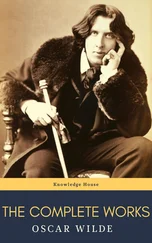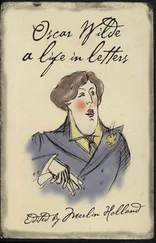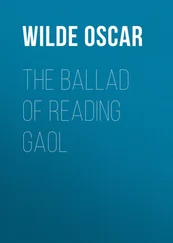Oscar Wilde - Complete Works of Oscar Wilde
Здесь есть возможность читать онлайн «Oscar Wilde - Complete Works of Oscar Wilde» — ознакомительный отрывок электронной книги совершенно бесплатно, а после прочтения отрывка купить полную версию. В некоторых случаях можно слушать аудио, скачать через торрент в формате fb2 и присутствует краткое содержание. Год выпуска: 0101, ISBN: 0101, Издательство: HarperCollins Publishers, Жанр: Классическая проза, на английском языке. Описание произведения, (предисловие) а так же отзывы посетителей доступны на портале библиотеки ЛибКат.
- Название:Complete Works of Oscar Wilde
- Автор:
- Издательство:HarperCollins Publishers
- Жанр:
- Год:0101
- ISBN:9780007386963
- Рейтинг книги:3 / 5. Голосов: 1
-
Избранное:Добавить в избранное
- Отзывы:
-
Ваша оценка:
- 60
- 1
- 2
- 3
- 4
- 5
Complete Works of Oscar Wilde: краткое содержание, описание и аннотация
Предлагаем к чтению аннотацию, описание, краткое содержание или предисловие (зависит от того, что написал сам автор книги «Complete Works of Oscar Wilde»). Если вы не нашли необходимую информацию о книге — напишите в комментариях, мы постараемся отыскать её.
Complete Works of Oscar Wilde — читать онлайн ознакомительный отрывок
Ниже представлен текст книги, разбитый по страницам. Система сохранения места последней прочитанной страницы, позволяет с удобством читать онлайн бесплатно книгу «Complete Works of Oscar Wilde», без необходимости каждый раз заново искать на чём Вы остановились. Поставьте закладку, и сможете в любой момент перейти на страницу, на которой закончили чтение.
Интервал:
Закладка:
The last scientific historian, it is possible to gather from his writings what he considered were the characteristics of the ideal writer of history; and no small light will be thrown on the progress of historical criticism if we strive to collect and analyse what in Polybius are more or less scattered expressions. The ideal historian must be contemporary with the events he describes, or removed from them by one generation only. Where it is possible, he is to be an eye-witness of what he writes of; where that is out of his power, he is to test all traditions and stories carefully and not to be ready to accept what is plausible in place of what is true. He is to be no bookworm living aloof from the experiences of the world in the artificial isolation of a university town, but a politician, a soldier, and a traveller, a man not merely of thought but of action, one who can do great things as well as write of them, who in the sphere of history could be what Byron and Aeschylus were in the sphere of poetry, at once le chantre et le héros. 1
He is to keep before his eyes the fact that chance is merely a synonym for our ignorance; that the reign of law pervades the domain of history as much as it does that of political science. He is to accustom himself to look on all occasions for rational and natural causes. And while he is to recognise the practical utility of the supernatural, in an educational point of view, he is not himself to indulge in such intellectual beating of the air as to admit the possibility of the violation of inviolable laws, or to argue in a sphere wherein argument is a priori annihilated. He is to be free from all bias towards friend and country; he is to be courteous and gentle in criticism; he is not to regard history as a mere opportunity for splendid and tragic writing; nor is he to falsify truth for the sake of a paradox or an epigram.
While acknowledging the importance of particular facts as samples of higher truths, he is to take a broad and general view of humanity. He is to deal with the whole race and with the world, not with particular tribes or separate countries. He is to bear in mind that the world is really an organism wherein no one part can be moved without the others being affected also. He is to distinguish between cause and occasion, between the influence of general laws and particular fancies, and he is to remember that the greatest lessons of the world are contained in history and that it is the historian’s duty to manifest them so as to save nations from following those unwise policies which always lead to dishonour and ruin, and to teach individuals to apprehend by the intellectual culture of history those truths which else they would have to learn in the bitter school of experience.
Now, as regards his theory of the necessity of the historian’s being contemporary with the events he describes, so far as the historian is a mere narrator the remark is undoubtedly true. But to appreciate the harmony and rational position of the facts of a great epoch, to discover its laws, the causes which produced it and the effects which it generates, the scene must be viewed from a certain height and distance to be completely apprehended. A thoroughly contemporary historian such as Lord Clarendon or Thucydides is in reality part of the history he criticises; and, in the case of such contemporary historians as Fabius and Philistus, Polybius is compelled to acknowledge that they are misled by patriotic and other considerations. Against Polybius himself no such accusation can be made. He indeed of all men is able, as from some lofty tower, to discern the whole tendency of the ancient world, the triumph of Roman institutions and of Greek thought which is the last message of the old world and, in a more spiritual sense, has become the Gospel of the new.
One thing indeed he did not see, or if he saw it, he thought but little of it – how from the East there was spreading over the world, as a wave spreads, a spiritual inroad of new religions from the time when the Pessinuntine mother of the gods, a shapeless mass of stone, was brought to the eternal city by her holiest citizen, to the day when the ship Castor and Pollux stood in at Puteoli, and St. Paul turned his face towards martyrdom and victory at Rome, Polybius was able to predict, from his knowledge of the causes of revolutions and the tendencies of the various forms of governments, the uprising of that democratic tone of thought which, as soon as a seed is sown in the murder of the Gracchi and the exile of Marius, culminated as all democratic movements do culminate, in the supreme authority of one man, the lordship of the world under the world’s rightful lord Caius Julius Caesar. This, indeed, he saw in no uncertain way. But the turning of all men’s hearts to the East, the first glimmering of that splendid dawn, which broke over the hills of Galilee and flooded the earth like wine, was hidden from his eyes.
There are many points in the description of the ideal historian which one may compare to the picture which Plato has given us of the ideal philosopher. They are both ‘spectators of all time and all existence.’ Nothing is contemptible in their eyes, for all things have a meaning, and they both walk in august reasonableness before all men, conscious of the workings of God yet free from all terror of mendicant priest or vagrant miracle-worker. But the parallel ends here. For the one stands aloof from the world-storm of sleet and hail, his eyes fixed on distant and sunlit heights, loving knowledge, for the sake of knowledge and wisdom for the joy of wisdom, while the other is an eager actor in the world ever seeking to apply his knowledge to useful things. Both equally desire truth, but the one because of its utility, the other for its beauty. This historian regards it as the rational principle of all true history, and no more. To the other it comes as an all-pervading and mystic enthusiasm, ‘like the desire of strong wine, the craving of ambition, the passionate love of what is beautiful.’
Still, though we miss in the historian those higher and more practical qualities which the philosopher of the Academe alone of all men possessed, we must not blind ourselves to the merits of that great rationalist who seems to have anticipated the very latest words of modern science. Nor yet is he to be regarded merely in the narrow light in which he is estimated by most modern critics, as the explicit champion of rationalism and nothing more. For he is connected with another idea, the course of which is as the course of that great river of his native Arcadia which, springing from some arid and sun-bleached rock, gathers strength and beauty as it flows till it reaches the asphodel meadows of Olympia and the light and laughter of Ionian waters.
For in him we can discern the first notes of that great cult of the sevenhilled city which made Virgil write his epic and Livy his history, which found in Dante its highest exponent, which dreamed of an Empire where the Emperor would care for the bodies and the Pope for the souls of men, and so has passed into the conception of God’s spiritual empire and the universal brotherhood of man and widened into the huge ocean of universal thought as the Peneus loses itself in the sea.
Polybius is the last scientific historian of Greece. The writer who seems fittingly to complete the progress of thought is a writer of biographies only. I will not here touch on Plutarch’s employment of the inductive method as shown in his constant use of inscription and statue, of public document and building and the like, because they involve no new method. It is his attitude towards miracles of which I desire to treat.
Plutarch is philosophic enough to see that in the sense of a violation of the laws of nature a miracle is impossible. It is absurd, he says, to imagine that the statue of a saint can speak, and that an inanimate object not possessing the vocal organs should be able to utter an articulate sound. Upon the other hand, he protests against science imagining that, by explaining the natural causes of things, it has explained away their transcendental meaning. ‘When the tears on the cheek of some holy statue have been analysed into the moisture which certain temperatures produce on wood and marble, it yet by no means follows that they were not a sign of grief and mourning set there by God Himself.’ When Lampon saw in the prodigy of the one-horned ram the omen of the supreme rule of Pericles, and when Anaxagoras showed that the abnormal development was the rational resultant of the peculiar formation of the skull, the dreamer and the man of science were both right; it was the business of the latter to consider how the prodigy came about, of the former to show why it was so formed and what it so portended. The progression of thought is exemplified in all particulars. Herodotus had a glimmering sense of the impossibility of a violation of nature. Thucydides ignored the supernatural. Polybius rationalised it. Plutarch raises it to its mystical heights again, though he bases it on law. In a word, Plutarch felt that while science brings the supernatural down to the natural, yet ultimately all that is natural is really supernatural. To him, as to many of our own day, religion was that transcendental attitude of the mind which, contemplating a world resting on inviolable law, is yet comforted and seeks to worship God not in the violation but in the fulfilment of nature.
Читать дальшеИнтервал:
Закладка:
Похожие книги на «Complete Works of Oscar Wilde»
Представляем Вашему вниманию похожие книги на «Complete Works of Oscar Wilde» списком для выбора. Мы отобрали схожую по названию и смыслу литературу в надежде предоставить читателям больше вариантов отыскать новые, интересные, ещё непрочитанные произведения.
Обсуждение, отзывы о книге «Complete Works of Oscar Wilde» и просто собственные мнения читателей. Оставьте ваши комментарии, напишите, что Вы думаете о произведении, его смысле или главных героях. Укажите что конкретно понравилось, а что нет, и почему Вы так считаете.












